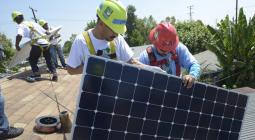Is climate change affecting our socio-economic classes differently?

Carbon tax has featured prominently during the EU election campaign. The key issue is whether poorer households will be expected to pay a CO2 tax, when they emit less than high earners. In an interview with EURACTIV Germany, two climate scientists discuss climate change affecting the class system and consumer behaviour.
Michael Lindner is a mathematician who has researched the stability of electricity grids at the Potsdam Institute for Climate Impact Research. Antonia Schuster is an agricultural economist who focused her research on socio-metabolic classes at the Institute. Both are currently involved in the Cliesciety project, where they provide information on climate change.
EURACTIV Germany interviewed them after their presentation at this year’s Re:publica event in Berlin.
People’s carbon footprints sometimes differ considerably. Why is this?
Antonia Schuster (AS): Of course, you have to be careful with such correlations. But studies basically show that higher education and income correlate with a person’s ecological footprint. Many other factors also play a role, such as the social and cultural environment.
Especially here in Germany, our footprint is quite high due to material prosperity. Also, it is not the case that people with more environmental awareness inevitably emit less CO2. Unfortunately, we do not want to give up our privileged lifestyle; as the argument often goes: “If others do not do it, then why should I?”.
Michael Lindner (ML): The problem is not just an individual one. If all you need to pay is €30 to fly to Mallorca, the issue is also political, as false incentives are being set.
Much of today’s public climate change debate takes place online. Does it liberate or divide our society?
AS: Of course, the internet allows people to network. A great example for this is Fridays for Future. But the online discussion culture can also be dangerous. Too often, there is no objective and constructive exchange, and many people feel personally attacked in the debate.
Is climate change only a discussion topic for elites?
ML: Globally speaking, the debate is not for the elite. Climate awareness is particularly strong in the poorest countries most affected by climate change. People in those countries are feeling the effects every day. Over here, we are more distanced from it, but that is also in the process of changing.
Mrs Schuster, you have researched CO2 emissions from a socio-economic class perspective. What is behind this?
AS: A new class theory, according to which today’s social classes do not necessarily differ in income or work, as Karl Marx, for example, theorised. Instead, we are seeing the emergence of emission classes – also called socio-metabolic classes.
For this, we analyse the material and energy flows in a specific society or at the global level. In this case, we studied CO2 and found stark differences between carbon footprints left behind by individuals. The next step is to find out what people from different classes have in common and what their life realities are. This will allow us to identify the so-called “emission hotspots”.
Statistics show that 20% of global CO2 emissions from consumers come from the richest 1%. Wealthy people have a very high CO2 footprint because of their housing situation, as well as their travel and consumption habits.
This raises the question of to what extent we could achieve our climate goals by redistributing wealth.
In your presentation, you called for the implementation of so-called “social tipping points”. What exactly are you talking about?
AS: These are tipping points of systems that can lead to a sufficiently rapid reduction of anthropogenic greenhouse gas emissions. One might think that a majority is needed to bring about social change, but research points to 20-25% of the population being enough if these have some room for manoeuvre.
Protests at the Hambach Forest near Cologne and Fridays For Future show us the reach and impact of politics on society.
In your opinion, what political framework would be needed to achieve this tipping point so that consumers change their behaviour?
ML: Even if I was initially sceptical, I am now convinced that implementing a CO2 tax would be quite sensible. It would create a permanent financial incentive to promote climate-friendly behaviour and could trigger a form of snowball effect. If done right, it could also relieve the burden on low-income households, for example by repaying tax revenues in the form of a carbon dividend.
AS: We also need more incentives and expand our infrastructure to offer affordable alternatives. Also, we need to change our financial system, urban planning, energy production, storage, education, as well as our norms and values. Making changes to these systems could potentially act as tipping points and quickly cause major system-wide changes.
The problem is that, as individuals or society as a whole, it is difficult to change our own climate-damaging lifestyle if this means making sacrifices.
This is hypocritical, of course, because climate change primarily affects the global South, not us central Europeans. Such ignorance cannot be accepted, particularly given the historical context.
Finding solutions to this dilemma is one of the greatest political challenges of our time.
May 2019
![]()




